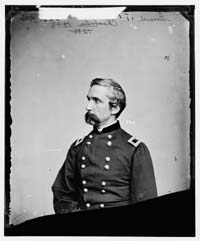 |
 |
| current issue |  |
past issues |  |
send a letter/news |  |
address update |  |
advertise |  |
about us |  |
alumni home |
Campus Currents
Battle Lessons for Corporate Generalsby Jeffrey Klineman
For centuries, new generations of military leaders have been trained by touring the fields of battles fought long ago. Today, a UNH-Manchester professor has teamed up with a program to develop business leaders the same way.
 Three Confederate prisoners pose after the battle.
Three Confederate prisoners pose after the battle.
|
UNH-Manchester assistant business professor Jack McCarthy takes participants, usually senior managers at private corporations, to Gettysburg, Penn., the site of a pivotal battle in the Civil War, and also incorporates the battle into his classes. McCarthy believes the three-day battle in July 1863 offers lessons in decision-making that are strongly analogous to the corporate world.
The central concept, he says, is "decision-making under chaos and uncertainty. When you've had a bad day, when you need to make decisions with limited information, you try to put yourself in the shoes of someone who is under cannon fire. That sort of pressure is timeless."
McCarthy's module starts with a discussion of business strategy and leadership, followed by a visit to the battlefield, where participants view the positions that affected the battle's outcome. He then compares the orders given to two new officers: Confederate Gen. Richard Ewell and Union Col. Joshua Chamberlain, a rhetoric professor from Maine.
On the first day of battle, Gen. Robert E. Lee ordered Ewell, who was replacing the slain Stonewall Jackson, to lead a charge and take Cemetery Hill "if practicable." Ewell made gains against Union forces, but when his troops tired, he decided not to take the hill, telling Lee that it was "not practicable." That decision eventually undermined Lee's trust in his subordinates, leading to poor decisions later in the battle.
 An 1863 lithograph of the Battle of Gettysburg.
An 1863 lithograph of the Battle of Gettysburg.
|
"Jackson would have understood Lee wanted him to take the hill," says McCarthy. "Ewell was new, and afraid to mess up."
By comparison, on the second day of battle, Chamberlain, with less than one year of leadership under his belt, was left with just one order: hold the flank at all peril. By the end of the day, Chamberlain's troops were exhausted and their ammunition depleted. But, remembering his orders, Chamberlain ordered his men to charge, using their bayonets. The Confederates retreated, and Chamberlain's regiment captured almost an entire brigade with empty guns.
 Gen. Richard Ewell
Gen. Richard Ewell
|
 Col. Joshua Chamberlain
Col. Joshua Chamberlain
|
"The lesson there is to understand the capabilities of those you put in executive positions, and be aware of your own communication patterns," says McCarthy, who works with colleagues at Boston University's Executive Leadership Center to offer the program. "To what extent did Lee realize he wasn't speaking to Stonewall Jackson? To what extent did he realize he should have been clearer in his orders, and not assume that the other person would understand? When you look at Chamberlain, a senior executive looked him in the eye and said, 'Here's the deal, you will hold this ground.' It speaks a lot to the way you work with junior executives."
Easy to print version
blog comments powered by Disqus
Current issue | Past issues | Current class notes | Class notes archives
Department archives | Send a letter/news | Address updates
Advertise | About UNH Magazine | Alumni home | UNH home
University of New Hampshire Alumni Association
9 Edgewood Road Durham NH 03824 (603) 862-2040
alumni@unh.edu

